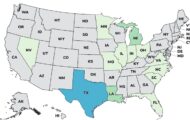The USDA has approved new GE corn and soy, which environmental and food safety advocates say will mean the release of millions of pounds of more pesticides into the environment. Center for Food Safety has condemned this decision to fully deregulate Dow Chemical’s Enlist corn and soybeans. Those crops are engineered to withstand “repeated spraying of the herbicide 2,4-D.” The EPA has yet to approve this new herbicide.
 Andrew Kimbrell, executive director of Center for Food Safety said in a statement, “2,4-D resistant crops pose a monumental threat to our nation’s agricultural, environmental, and human health. With this approval comes millions of more pounds of toxic herbicides dumped onto our land. Center for Food Safety will pursue all available legal options to stop the commercialization of these dangerous crops.”
Andrew Kimbrell, executive director of Center for Food Safety said in a statement, “2,4-D resistant crops pose a monumental threat to our nation’s agricultural, environmental, and human health. With this approval comes millions of more pounds of toxic herbicides dumped onto our land. Center for Food Safety will pursue all available legal options to stop the commercialization of these dangerous crops.”
2,4-D was a component of Agent Orange, the defoliant used in Vietnam that has caused a myriad of health problems in Vietnam vets, ranging from Parkinson’s disease to cancers, non-Hodgkin’s lymphoma, kidney and liver damage, soft tissue sarcoma, and reproductive problems. The 2,4-D resistant crops were developed because of a massive increase in Roundup Ready-resistant weeds that occurred after Roundup Ready GE crops were introduced.
Dow claims that 2,4-D crops are the solution to weed resistance, but a recent study in the journal Bioscience has found that these new GE crops will “instead pour oil on the fire by triggering still more intractable weeds resistant to both glyphosate and 2,4-D. In addition, USDA’s own analysis has found that approving these crops will cause a 2 to 7-fold increase in agricultural use of 2,4-D by the year 2020. 2,4-D drift is responsible for crop injury more than any other herbicide.
Kimbrell continued, “this is not the solution to our super weed problem and ail only spur the evolution of yet more herbicide-resistant weeds. We need a new direction for our agricultural system, not increased reliance on chemicals.”
The group Beyond Pesticides states that research has found weed resistance to 2,4-D is already developing in the western United States even before these GE crops have been planted. A 2012 report also shows that GE crops are “responsible for an increase of 404,000,000 pounds of pesticides over the first 16 years of commercial use of GE crops.”
2,4-D kills broadleaf weeds by causing rapid growth. Babies born in counties where these herbicides are used are “significantly more likely (60 to 90%) to be born with birth defects of the respiratory and circulatory systems, as well as defects of the musculoskeletal system like clubfoot, fused digits, and extra digits,” according to research by the EPA.




